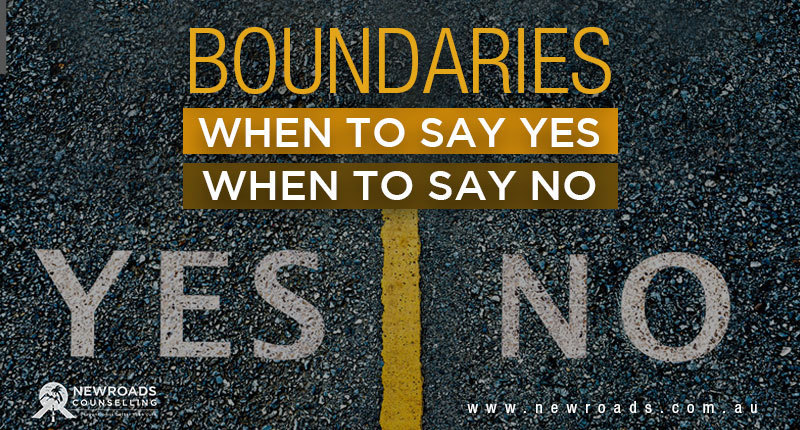
- Are you good in persuading?
- Do you hate taking responsibilities?
- Are you struggling to hear and accept “No”?
Or…
- Are you feeling exhausted and stretched with life’s demands?
- Does your life seem out of control?
- Do you feel taken for granted by others?
- Are you feeling guilty when you say “No”?
- Is your life always “go on the run” with no time to sit and relax?
If you experience one or more of these symptoms, you most likely have some boundary issues.
WHAT ARE BOUNDARIES?
Sometimes people misunderstand that setting boundaries is seen as being selfish, rigid, rebellious or even seen as controlling. Well, none of these are true! Setting boundaries are also not about putting your walls up.
Boundaries define which responsibilities belong to us and which ones do not. Having boundaries means you know when to say YES to the good and NO to the bad, so you can take control of your life (H Cloud & J Townsend, Boundaries, Zondervan Pub. House, Michigan, 1992).
So, a boundary is about responsibility, that we are responsible FOR ourselves and are responsible TO others by making others responsible FOR their own so they can be responsible TO us by saying “No, thank you, I can take the responsible FOR myself”. For instance, between parents and their adolescents, sometimes some parents become over-responsible or responsible FOR their teens and that makes their teens become under-responsible. So what these parents need to do is to let go of some of the responsibilities, for their teens to be responsible FOR themselves, even though there will be some chaos or consequences that both parents and their teens have to experience at the beginning, e.g. when teens wake up late, they are late for school. This consequence of being late and not being rescued will help them wake up early by themselves, rather than you waking them up to help them avoid being late.
WHAT IS THE BENEFIT OF SETTING CLEAR BOUNDARIES?
Having clear boundaries in our lives is essential in order to have a healthy and balanced life. Whereas, a lack of boundaries can cause pain, loneliness, getting burnt out, control, violation or irresponsibility, which can impact the individuals emotionally, mentally, physically and even spiritually.
Boundaries help us to define ourselves, giving us freedom to walk as a loving, caring, respected, fulfilled individual. Boundaries also help us to reduce unnecessary problems and to resolve issues in the relationships with others, with your spouse/partner, children/adolescents/adult children, parents, in-laws, colleagues, friends, or within yourselves. Having clear boundaries will increase care, respect and create secure relationships.
WHAT ARE THE CONSEQUENCES OF SETTING BOUNDARIES?
Setting boundaries can bring some consequences, e.g.:
- Feeling bad and guilty for the person who let go of their over-responsibilities
- Feeling upset, unhappy, disappointed, angry, blaming, demanding for the person who is being set boundaries
It is normal if you experience some tensions in the relationship at the beginning, or the relationship becomes strained, because of the changes that needs to take place when you set your boundaries.
HOW TO SET CLEAR BOUNDARIES
Often we want to change our situation by changing others, however, changing others is hard work and there are times that it’s impossible to do so. So setting clear boundaries has to start from within ourselves. Having a lack of boundaries is a learning process one experiences in life, therefore setting boundaries is also a process that you and your significant other have to go through. As it is a process that is sometimes stemmed from childhood, you may need a professional’s help, who can help you:
- Recognising your lack of boundaries
- Exploring the cause and the core of your lack of boundaries
- Understanding clear boundaries, when to say ‘Yes’ and when to say ‘No’
- Understanding the responsibility for self and responsibility to others
- Learning how to respect yourself and being in control of your life
- Learning how to establish and to work on clear boundaries, including personal boundaries, boundaries with others, working through conflicts, etc.
- Changing the wrong belief systems due to lack of boundaries
- Dealing with the impact of setting clear boundaries, e.g. feeling bad and guilty, blamed, etc.
However, there are some practical steps that you can try, to set clear boundaries, by asking and evaluating yourself with these questions below:
For those who are under-responsible or when you don’t feel like taking responsibility, ask yourself:
- “Am I too lazy to take this responsibility?”
- “Do I burden others?”
- “Why am I reacting when someone says NO to me?”
- “How old am I when I react on something or to someone?
- “Where this upset/anger/disappointment/unhappiness stemmed from?”
For those who are over-responsible or when you feel exhausted/resentful. ask yourself:
- “Actually, whose responsibility is it?”
- “What message do I want to pass on to the other person?”
- “Is it good for the other person?”
- “Is it good for me?”
- “Is it going to help the other person become more responsible FOR themselves or not?”
- “Is it out of love or just being spiteful when I say NO?”
- “Is setting boundaries for the purpose to serve me or to serve others?”
- “When I feel bad and guilty, is it the right guilt or the wrong guilt?”
Bear in mind that having clear boundaries needs a lot of practice, consistency and perseverance, as this process of setting it won’t come naturally.
